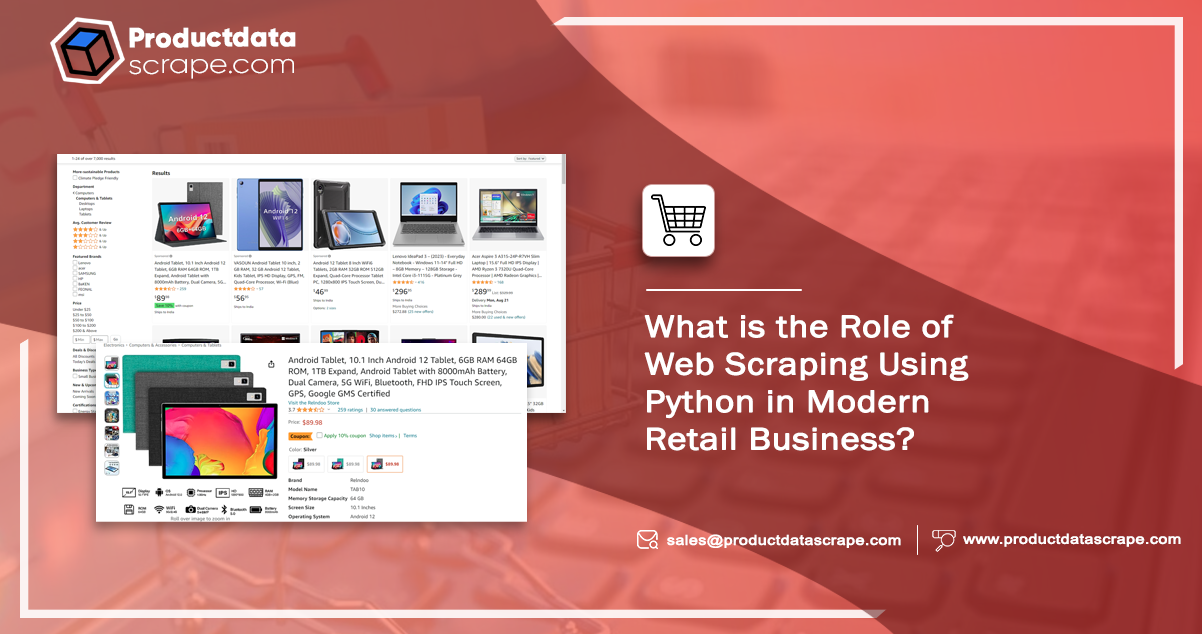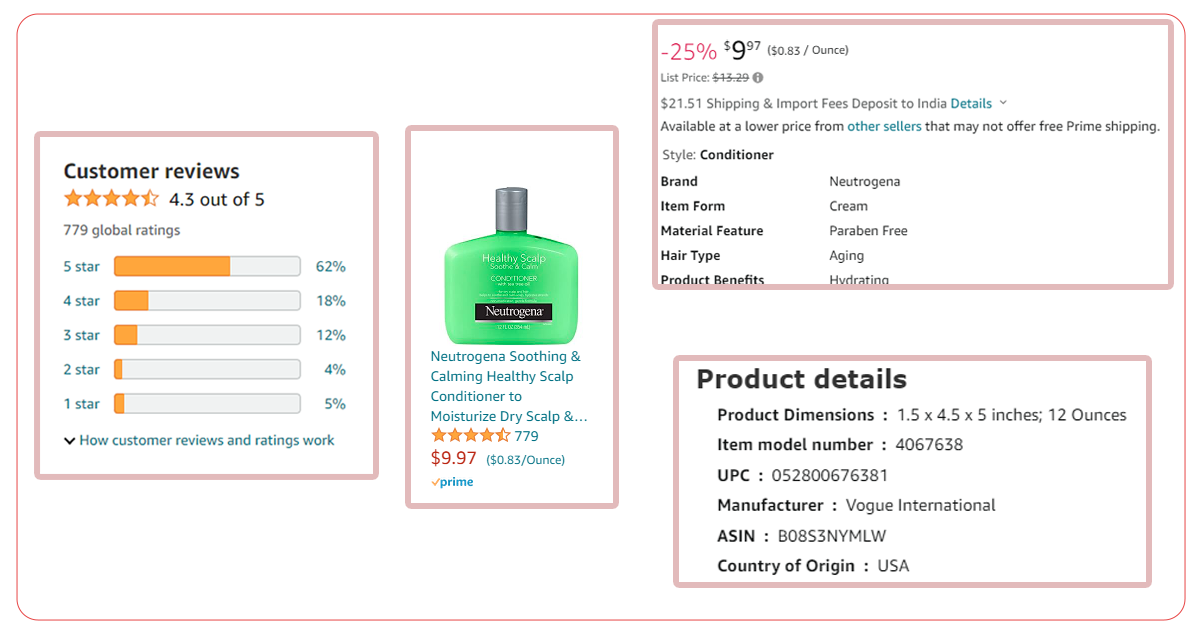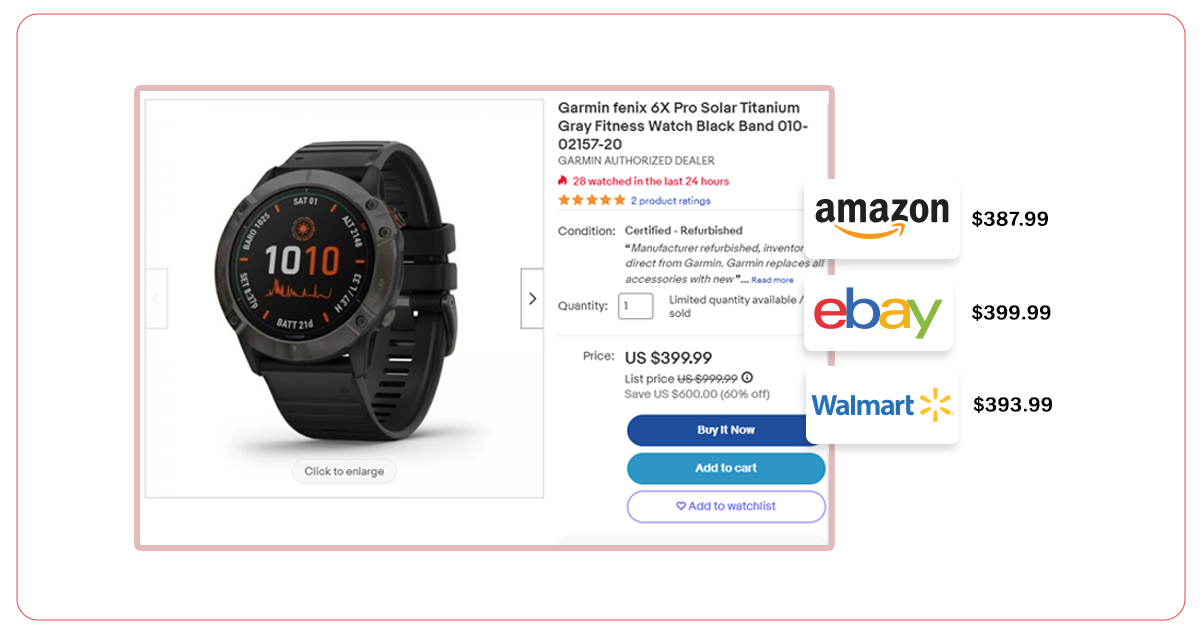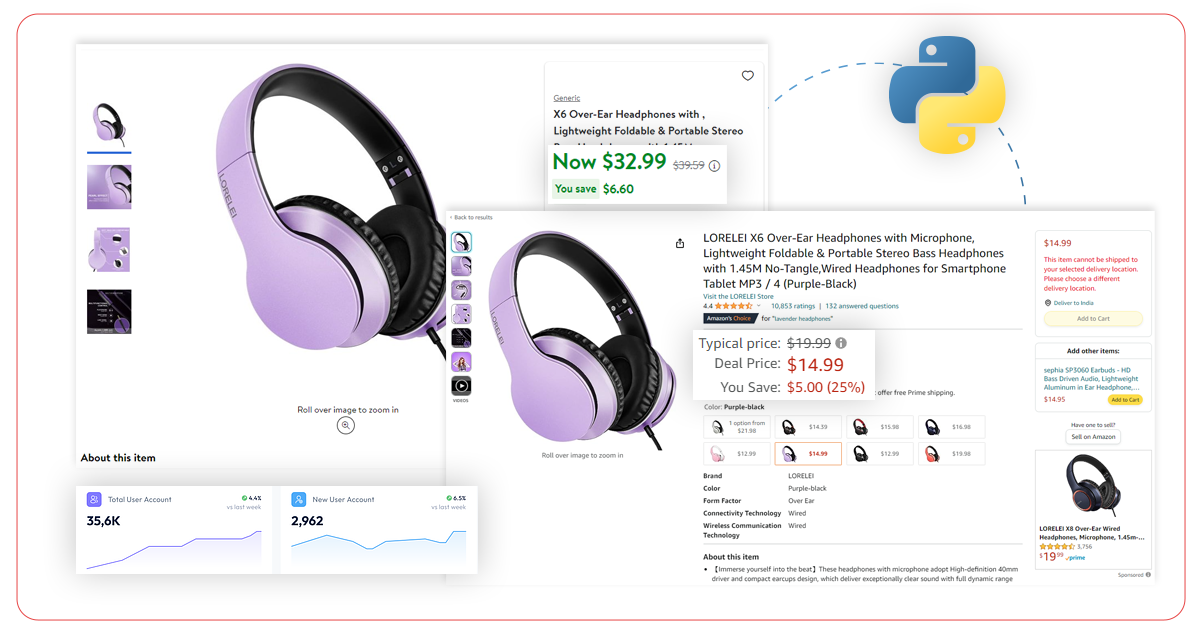
Web scraping is a valuable method for eCommerce brands to gather data from
websites and conduct market research. It allows retailers to optimize their eCommerce websites
and offerings by collecting data from large or multiple websites. It can automate gathering
information from an online retailer's product page, saving time and effort. It can extract
details such as product name, description, price, size, colors, reviews, and availability. By
automating this process, web scraping eCommerce websites makes it easier to export the data in a
more usable and organized format, facilitating analysis and decision-making. Python is a popular
choice for web scraping due to its versatility, user-friendly nature, and the availability of
extensive libraries specifically designed for web scraping.
List of Data Fields

Following list of data fields are available on eCommerce data scraping.
- Product Name
- Product Description
- Product Price
- Product Size
- Product Colors
- Reviews
- Product Availability
- Ratings
- Images
- Specifications
- Categories
- Variations
- Discounts or Promotions
- Seller Information.
Role of Web Scraping in Modern Retail Business

Whether structured or unstructured, data holds immense significance in propelling
business growth and fostering innovation. The prominence of big data has underscored the
indispensability of web scraping in unlocking growth opportunities across various industries.
Effective website monitoring and web crawling processes have become vital in extracting
pertinent
data for businesses.
Ultimately, the web data encompassing sales figures, customer feedback, and product
information holds the utmost importance. While organizations can gather many data points,
retailers
rely on this information collected through web scraper to make informed decisions that translate
into tangible outcomes.
Price Strategy: A well-crafted pricing strategy is critical to maximizing
profitability for retailers. To achieve this, they must continually assess and adapt their
pricing
approach based on market trends, customer behavior, and inventory considerations. While internal
data is valuable, incorporating competitor and pricing information is crucial. Consequently,
businesses are increasingly interested in web scraping products data and regularly pricing from
competitor brands. By analyzing these figures, retailers can gain insights into market trends
and
make informed pricing decisions, whether setting premium prices or offering discounts. Web
scraping
is a valuable tool for analyzing the competitive landscape, providing retailers with a solid
foundation for formulating effective pricing strategies.
Campaign Monitoring: In pursuing effective brand promotion, many companies
embrace
innovative mediums and channels. Among these, video marketing has gained significant traction
worldwide. Retailers can harness the power of platforms like YouTube, which offer quickly
measurable
statistics such as views, visits, likes, and comments. While these metrics alone do not
determine
the success of a campaign, they can contribute to raising awareness and gauging interest within
the
target market.
To gain deeper insights, scraping e-commerce websites and extracting comments data from video
platforms becomes valuable. It enables retailers to understand how viewers perceive the videos.
By
employing sentiment analysis tools, it becomes possible to measure current interest levels and
develop future campaigns based on the gathered insights. Additionally, gathering customer
reviews
from various websites and social media channels and responses from news coverage can further
enhance
the understanding of audience sentiment and inform decision-making processes.
Demand Analysis: Retailers often prioritize products that are popular or
projected
to be popular among their target audience based on anticipated demand. One way to gauge demand
is by
analyzing sales figures, which provide valuable insights, particularly when launching new or
similar
products. In product data scrape, classified sites are ideal platforms for e-commerce price
monitoring, especially for obtaining detailed information about popular items. By scraping rates
within specific categories, retailers can identify products that perform well in specific
demographics, allowing them to prioritize those products within their offerings. This
competitive
intelligence enables retailers to align their store with successful products, even if other
brands
offer them.
Channel Partner Management: For e-commerce retailers who operate through channel
partners, adhering to the minimum retail price is crucial. Retailers must actively monitor any
fluctuations in pricing set by these resellers. Channel partners may occasionally hold flash
sales
for specific products, offering discounted prices for a limited period before returning to the
regular price. By monitoring websites in real-time, retailers can stay informed about instances
when
the price falls below the minimum retail price (MRP). It allows them to take appropriate actions
or
engage with the channel partners to address deviations from the established pricing guidelines.
Inventory Management: eCommerce data scraping services enable retailers to
monitor
product availability and stock levels across multiple websites or marketplaces. By collecting
real-time inventory data, retailers can optimize their inventory management processes, avoid
stockouts, and accurately forecast demand to ensure they have the right products.
Market Analysis and Trend Identification: Web scraping provides retailers access
to
a vast amount of market data, including consumer behavior, demographic information, and market
trends. By analyzing this data, retailers can gain valuable insights into their target market,
identify emerging trends, and make data-driven business decisions.
Brand Monitoring and Reputation Management: Web scraping allows retailers to
monitor
mentions, reviews, and feedback about their brands across various platforms and social media
channels. It helps retailers understand their brand perception, identify potential issues, and
respond promptly to customer feedback to maintain a positive brand image.
E-commerce Optimization: Web scraping assists retailers in gathering data on
their
own website performance, user behavior, and conversion rates. This data is helpful to optimize
the
user experience, enhance website design, and improve overall e-commerce performance.
About Python Web Scraping
Python is the most popular programming language for web scraping due to its
versatility
and extensive libraries and frameworks. With its user-friendly syntax and powerful capabilities,
Python provides an ideal platform for developing web scraping applications. This language has
gained
popularity for its ease of use and ability to handle various aspects of web scraping
effectively.
How Can Retail Businesses Benefit from Python Web Scraping?

Organizations face fierce competition and evolving consumer expectations in today's digital
commerce
landscape. To stay ahead, brands must invest in market research to understand changing trends in
product offerings and online experiences. Web scraping using Python in modern retail business
has
emerged as a valuable and efficient tool to meet these needs. It enables organizations to
quickly
gather relevant data and gain insights that help them stay competitive. Some key benefits of web
scraping include the following:
- Competitor Price Monitoring: Monitor competitor prices in real-time to
make
informed pricing decisions and stay competitive.
- Product Performance Analysis: Gather data on product performance, including
price, inventory levels, and customer reviews, to inform product research and development.
- Optimization of Advertisements: Gather information on target audiences and
competitor ad strategies to optimize advertising campaigns.
- Predicting Future Trends: Identify emerging trends from various sources to
stay
ahead.
- Improved Marketing Strategies: Gather data on consumers, competitors, and
market trends to build customer personas and improve marketing campaigns.
- Competitor Analysis: Monitor competitors across different variables to
identify
market gaps and opportunities.
- Consumer Sentiment Analysis: Analyze customer reviews and feedback to
understand customer preferences and improve product selection and web design.
- Inventory Management: Extract catalog data to keep inventory current and
optimized.
Conclusion:
Web scraping has become increasingly vital in modern retail businesses. It is crucial in driving
growth, innovation, and informed decision-making. By leveraging web scraping techniques,
retailers
can gather valuable data, including sales figures, customer feedback, product information,
competitor pricing, market trends, and sentiment analysis. This data empowers retailers to make
strategic pricing decisions, identify popular products, monitor channel partner pricing, and
stay
ahead of the competition.
At Product Data Scrape, we ensure that our Competitor
Price
Monitoring Services and Mobile App Data Scraping maintain the highest standards of
business
ethics and lead all operations. We have multiple offices around the world to fulfill our
customers'
requirements.




































.webp)






